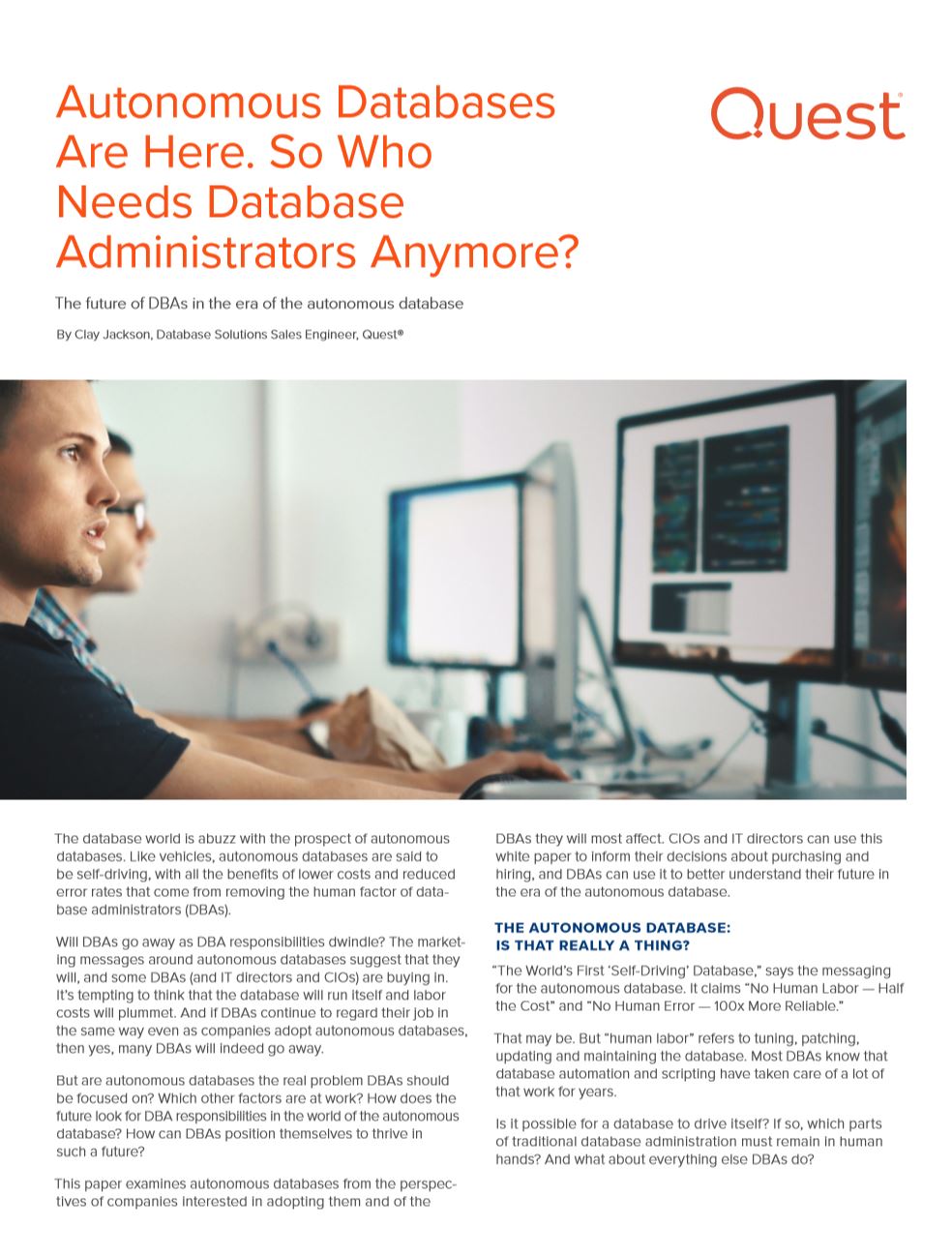Are autonomous databases the doom of database administrators?
For DBAs, the gradual pervasiveness of autonomous databases means it’s time for them to sink or swim

Automation is generally observed from one of two standpoints: those it affects positively and those it affects negatively. In the enterprise, it’s decision makers who mainly comprise the former group, as automation is able to lead to valuable cost savings through a reduction of staff, along with higher levels of efficiency.
Some employees on the ground, the lucky ones at least, also benefit. With their roles, at least to a degree, able to be completed by an automated machine, they themselves are liberated to pursue more valuable tasks that can enhance their personal skill sets and boost the enterprise as a whole.
RELATED RESOURCE

The future of database administrators in the era of the autonomous database
Autonomous databases are here. So who needs database administrators anymore?
But what about those that aren’t so lucky? Automation has been displacing jobs since the industrial revolution, with low-skilled workers laid off to give way to rows of chugging machines. Negative connotations attached to automation initiatives from that period continue to stream through society today.
Database administrators (DBAs) would be forgiven for harbouring this sentiment. At first glance, the rise of the autonomous database appears to threaten their livelihoods. But is there a way the two can coexist?
The need for an autonomous database
Databases are used to store information that’s critical to the efficient operation of the modern enterprise. Any firm with a digital element (in other words, any firm) will no doubt lean on a database, and most likely employ DBAs in order to maintain them.
DBAs however often find themselves overburdened with the laborious manual tasks related to database maintenance and management, to the extent that errors begin to creep into their work. And when it comes to errors and databases, no matter how inconsequential the mistake may seem, it can have a debilitating impact on uptime, performance, and security.
Take patching as an example. Failing to apply an update can create vulnerabilities, while applying the patch incorrectly undermines the security features it’s designed to bolster. Unsecured databases leave the enterprise at risk of breaches that damage both revenues and reputation. Further, the pure amount of data that the modern enterprise has to process is burying DBAs in a workload they can’t hope to meet successfully.
Get the ITPro daily newsletter
Sign up today and you will receive a free copy of our Future Focus 2025 report - the leading guidance on AI, cybersecurity and other IT challenges as per 700+ senior executives
This considered, along with society's general trajectory towards automation, it was only a matter of time before databases were embedded with artificial intelligence and machine learning capabilities.
Shifting roles
Autonomous databases certainly aren’t the doom of the enterprise. With an autonomous database, errors are eradicated, ensuring maximum database uptime, performance and security, all while reducing costs and upping productivity, with automation able to complete menial tasks in a fraction of the time it takes a human predecessor.
A byproduct, yet certainly of no lesser importance, is the human impact, specifically regarding DBAs. When working with an autonomous database, DBAs find the tasks they used to complete instead undertaken by technology, freeing them from the shackles of the mundane task. However, the danger remains that a freed workforce is potentially a redundant workforce. Vendors would argue this isn’t the case. Instead, DBAs can refocus on tasks that add greater value to the enterprise.
Yet it sounds unrealistic for all DBAs to be deployed in this manner. And surely the immediate monetary boosts of reducing numbers of employed DBAs will prove too tempting for at least some organisations.
Despite these lines of thought, DBAs can take solace in a trend that is seeing their roles shift to a more expansive set of responsibilities, as opposed to seeing their position becoming entirely redundant. For this DBAs owe their thanks to a shortcoming of the autonomous database, manifesting in an inability to manage personal data securely.
RELATED RESOURCE

The future of database administrators in the era of the autonomous database
Autonomous databases are here. So who needs database administrators anymore?
The power of data
A prerequisite of the autonomous database is migration to a cloud environment which can leave data vulnerable. Though cloud environments are managed by service providers, the responsibility of actually securing the personal data that’s stored within doesn’t fall at their door, this instead falling to the enterprise using the database. The enterprise must identify and protect personal data to ensure compliance with data protection regulation, with a failure to achieve this risking hefty fines. For this they need a reinvented DBA, a journey that should result in prior DBAs becoming data administrators.
The buck doesn’t stop there. The smart DBA will be future-proofing themselves whether they are immediately threatened by an autonomous database or not, by embracing the automation of database administration tasks and positioning themselves for a more strategic role within the enterprise, allowing them to collaborate with other pivotal members of the IT department as well as the wider enterprise.
In the modern world, data is pervasive and DBAs find themselves in the fortunate position of being equipped with a transferable data-based skill set that can be utilised in other areas of the enterprise, because in business knowledge is data. Having the ability to interpret data can uncover answers key to responding to rapidly evolving marketplaces. A future-proofed DBA will be closely aligned with this line of business, and be able to provide information that the enterprise can use to differentiate themselves from their competitors.
In short, the role of the DBA is unlikely to be entirely erased given their existing skill-set and the prevalence of data in other sectors of the enterprise; however as autonomous databases become more commonplace, there will certainly be a significant shift in the responsibilities of their role.
-
 CISA issues warning in wake of Oracle cloud credentials leak
CISA issues warning in wake of Oracle cloud credentials leakNews The security agency has published guidance for enterprises at risk
By Ross Kelly
-
 Reports: White House mulling DeepSeek ban amid investigation
Reports: White House mulling DeepSeek ban amid investigationNews Nvidia is caught up in US-China AI battle, but Huang still visits DeepSeek in Beijing
By Nicole Kobie
-
 The highest-paying tech jobs
The highest-paying tech jobsIn-depth A guide to the highest-paying tech jobs in both the US and UK, as well as the demands driving tech salaries
By Keri Allan
-
 UK gov urged to replace "inflexible" police records system
UK gov urged to replace "inflexible" police records systemNews Independent inquiry has given the Home Office eight weeks to come up with a plan to update the 47-year-old Police National Computer
By Bobby Hellard
-
 NHS Test and Trace IT blunder blamed on Microsoft Excel glitch
NHS Test and Trace IT blunder blamed on Microsoft Excel glitchNews The "technical issue" has led to a backlog of thousands of positive tests stretching to 25 September
By Keumars Afifi-Sabet
-
 SAP seeks $600m from Stella Artois brewer - what does this mean for other customers?
SAP seeks $600m from Stella Artois brewer - what does this mean for other customers?News Tech giant pursues licence dispute against Anheuser, another large customer
By Joe Curtis
-
 Larry Ellison biography: Salary and career history of Oracle's founder
Larry Ellison biography: Salary and career history of Oracle's founderBiographies The lowdown on Larry Ellison's salary, net worth, education and career history
By Rene Millman
-
 Larry Ellison steps down as Oracle CEO
Larry Ellison steps down as Oracle CEONews Mark Hurd and Safra Catz will share CEO duties
By Rene Millman
-
 IBM Pulse 2012: Louvre becomes Europe's first smart museum
IBM Pulse 2012: Louvre becomes Europe's first smart museumNews IBM has helped the Louvre Museum to implement an intelligent management system to keep its most important assets safe and available for visitors.
By Maggie Holland
-
 IBM IOD 2011: IBM keeps acquisition options open, takes swipe at HP
IBM IOD 2011: IBM keeps acquisition options open, takes swipe at HPNews IBM keeps mum on what or when the next big buy will be, but is happy to make a dig at HP's Autonomy acquisition.
By Maggie Holland